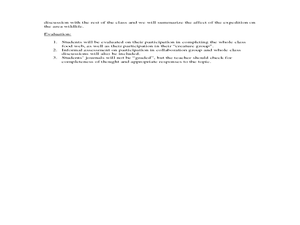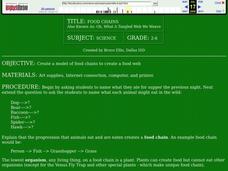Curated OER
It's not just pretty - it's a survival method!
First graders write explanations for why certain animals can only live in certain environments. In this animal survival lesson plan, 1st graders take pictures of animals and place them into the right environment after a instructional...
Curated OER
Oil Spill Dangers
Middle schoolers analyze the effects of oil spills on our environment and develop action plans to protect animals and habitats.
Curated OER
Animals and the Food Webs that Love Them
Learners study the animals that Lewis and Clark would have encountered. In this animals lesson students study the food web and how human populations have affected them.
Curated OER
More Than a Campground
Fourth graders participate in a class disucssion on the term "habitat". The class brainstorms on what makes a national park special. In small groups, they research a a national park and create a mural depicting those factors that make...
Curated OER
Make Way for Wild Migrants
Students discuss the threats facing migratory species and track the seasonal journeys of wildlife in real space and in cyberspace. Once they have gathered information from several sources, they create a portfolio to share with others...
Curated OER
Explore the Food Web
Students identify plants and animals in the journals of Lewis and Clark's expedition. They describe the various animal habits. Students interpret the behaviors of the animals discovered on the expedition. They design a food web using...
Curated OER
Caterpillar Camouflage
Students list animals, plant parts, and reasons for caterpillars to camouflage themselves. For this animal and plant adaptations lesson plan, students also play a game where they use colors as camouflage.
Curated OER
Writing Process- Expository Writing
Expository writing is the focus of the language arts lesson presented here. In it, young writers review what expository writing is through a class discussion and teacher demonstration. Then, learners write expository text that describes...
Curated OER
Fiction Stories
Students complete writing activities for fiction. In this fiction writing lesson, students complete four sets of activities in a writer's workshop format to practice reading and writing in a fiction style. Students develop plot outlines,...
Curated OER
It's A Zoo!
In this noun and article instructional activity, students review and identify nouns and articles in sentences. In this underline and short answer instructional activity, students answer eleven questions.
Curated OER
Creature Features
Young scholars examine why certain animals live in only specific places throughout the world. Using animals, they classify them based on their characteristics and identify their basic needs. They also observe and compare the life cycles...
Curated OER
Pulp Friction
In this reading comprehension worksheet, students have 12 minutes to read a text entitled "Pulp Friction" and answer comprehension questions based on the article. Students answer 10 multiple choice questions.
Curated OER
Skimming Exercise
In this skimming for information worksheet, students read a passage quickly to find the main ideas. Students have a short period of time to read the passage and complete the questions.
Curated OER
Monitor Marine Migrants
Students, in groups, track the seasonal journey of a species, such as a shorebird, sea turtle, or marine mammal, using various sources of migration data
Curated OER
Leaving Home
Learners explain the importance of larval dispersal and retention to populations. They collect data on organisms and examine it.
Enchanted Learning
Enchanted Learning: Polar Bears
Learn more about the polar bear when you visit this informative site that features a diagram of the polar bear and information on its diet, habitat, anatomy, reproduction and so on.
Utah Education Network
Uen: Life's Different Seasons
Recognize changes in bears and insects and compare them.
PBS
Pbs: Nature: Born to Be Wild, Polar Bears
Research the diet, habitat and behavior of polar bears, and compare and contrast the issues surrounding polar bears in their environment with those of bears in the U.S. Rocky Mountains. Rewrite a human/bear encounter from the bear's...
Environmental Education for Kids
Eek!: Habitats
Take a look at some of the different habitats that are home to many plants and animals including black bears, owls and various species of birds.
Other
Patagonia: A Bear's Journey (An Animal Migration Resource)
A resource about one grizzly bear's 50-mile migration that underscores the environmental issues associated with shrinking wildlife habitats.
PBS
Pbs Teachers: Scientific American: The New Zoos: Polar Bear Picnic
Explore zoos and the change in animal care, and research the physiology and habitats of polar bears. Investigate the difference between what is essential to survive and what is desirable in an enriched environment.
Kidport
Some Animals Live in Rock Caves
This site has brief illustrations and sample locations as to where the tiger, the bear, the moray eel and bat live.
Missouri Botanical Garden
Missouri Botanical Garden: Tundra Animals
Explore this comprehensive resource on the birds and mammals of the tundra. This resource features information such as diet, class, order, size, habitat, conservation range and the like.
























